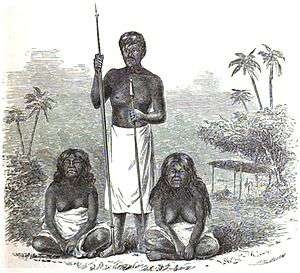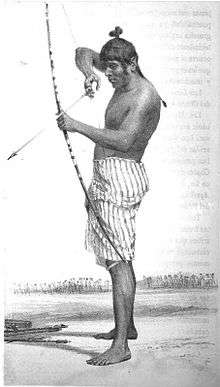Payaguá people

The Payaguá people were a tribe of the Guaycuru peoples in the Northern Chaco. The Payaguá were a river tribe, living, hunting, fishing, and raiding on the Paraguay River. The name Payaguá is unlikely to be the name they called themselves; rather, it is the name given to them by the Guaraní, their enemies whom they nearly constantly fought. It is possible that the name of the Paraguay River, and thus the region Paraguay itself, comes from this; the Guaraní told the Spanish that the river was the "Payaguá-ý", or "river of Payaguás."
The Payagua language is extinct; it is hypothesized to have been part of the Mataco-Guaicuru languages. No people remain who identify as Payaguá; the descendants of the tribe merged with other Paraguayans, either as mestizos or members of other Guaycuru.
History

The Payaguá were roughly divided into two groups; a northern branch who were loosely aligned with the Kadiweu people and fought the Portuguese, and a southern branch who largely fought the Spanish and Guaraní. These raids often focused on undefended farms or other vulnerable outlying regions, and the Payaguá did not hesitate to murder any civilians unlucky enough to stay in the area. The food & supplies from these raids helped sustain the Payaguá. These raids continued after the Spanish came to the region and allied and interbred with the Guaraní during the settlement of colonial Paraguay. The militia of the Spanish settlement dealt with a variety of hostile tribes of the Chaco, and the Payaguá was one tribe who was fought with frequently. They thus established a reputation as a warlike tribe; the Payaguá themselves did appear to hold raiders and raiding in high esteem.
By the late 18th century, however, the largely mestizo settlers of Paraguay began to get the upper hand on the Payaguá. The southern branch of the Payaguá were forced to submit during the governorship of Rafael de la Moneda. Moneda funded the construction of a series of forts along the Paraguay River to deny the Payaguá the use of the river that sustained their livelihood. Most Payaguá agreeing to the treaty were brought to settle near Asunción. In 1770, the northern branch of the Payaguá agreed to "become civilized" as well along with the Kadiweu. The network of forts now extended far enough northward, and the Portuguese defenses were strong enough, that the raiding lifestyle of the Payaguá was no longer profitable.
Culture
Little is recorded of Payaguá culture, aside from their propensity for raiding the Guaraní, Spanish, and Portuguese. The Payaguá buried their dead on river islands in the Paraguay River, and covered the deceased's head with red flowers of the Brugmansia plant.
See also
References
This article incorporates text translated from the Spanish Wikipedia article Payaguá, licensed under the Creative Commons Attribution-ShareAlike (cc-by-sa) license.
- AIBR. Revista de Antropología Iberoamericana. Los "Señores de los ríos" y sus alianzas políticas
- Florencia Roulet - CHIARA VANGELISTA: Confini e frontiere - EIAL XIV2